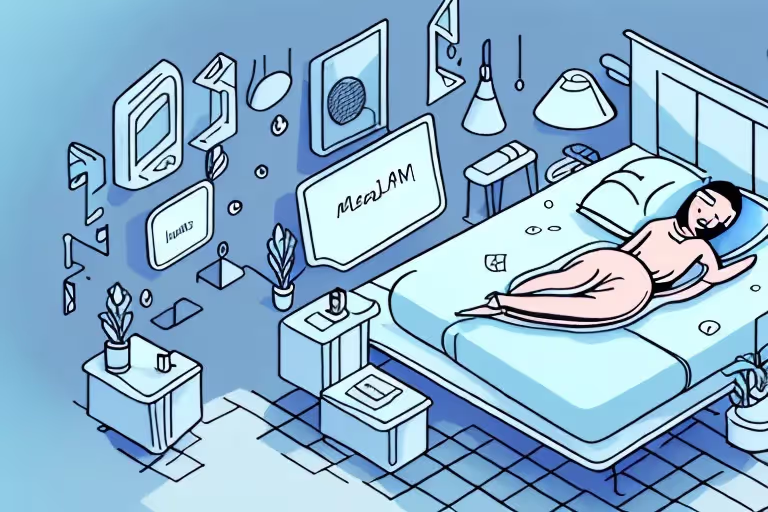Are you struggling to get a good night's sleep? If so, you're not alone. Sleep disorders and insomnia affect millions of people worldwide. One potential solution that has gained popularity is the use of Seroquel, a medication typically prescribed for mental health conditions. But what exactly is Seroquel, and how does it work? In this article, we'll explore the benefits and risks of using Seroquel for sleep, as well as alternative options that may be worth considering.
Understanding Seroquel: An Overview
Seroquel, also known by its generic name quetiapine, belongs to a class of medications called atypical antipsychotics. Originally developed to treat symptoms of schizophrenia and bipolar disorder, Seroquel has also been approved by the FDA for certain sleep disorders.
What is Seroquel?
Seroquel is a medication that affects the balance of chemicals in the brain, targeting specific receptors to help regulate mood and behavior. It works by blocking the action of neurotransmitters such as dopamine and serotonin, which are involved in the regulation of sleep-wake cycles.
How Does Seroquel Work?
When it comes to sleep, Seroquel primarily acts as a sedative, promoting relaxation and drowsiness. Its precise mechanism of action is not fully understood, but research suggests that it affects the level of neurotransmitters in the brain, leading to a calming effect that can aid in falling asleep and staying asleep.
Further studies have revealed that Seroquel not only affects the neurotransmitters involved in sleep regulation but also influences other brain chemicals, such as norepinephrine and histamine. These additional effects contribute to its sedative properties, making it an effective option for individuals struggling with sleep disorders.
Moreover, Seroquel's impact on the brain extends beyond its sedative properties. It has been found to have mood-stabilizing effects, making it useful in managing symptoms of bipolar disorder. By modulating the activity of certain neurotransmitters, Seroquel can help stabilize mood swings and reduce the frequency and intensity of manic and depressive episodes.
Additionally, Seroquel's antipsychotic properties have been extensively studied and utilized in the treatment of schizophrenia. It works by blocking dopamine receptors in the brain, which helps to alleviate hallucinations, delusions, and other psychotic symptoms associated with the condition.
It is important to note that Seroquel should only be used under the guidance and supervision of a healthcare professional. The dosage and duration of treatment will vary depending on the specific condition being treated, and it is crucial to follow the prescribed regimen to ensure optimal results and minimize potential side effects.
In conclusion, Seroquel, with its diverse effects on brain chemistry, offers a multifaceted approach to treating various conditions, including sleep disorders, bipolar disorder, and schizophrenia. Its ability to modulate neurotransmitters and promote sedation makes it a valuable tool in managing these complex conditions, providing relief and improving the quality of life for many individuals.
The Role of Seroquel in Sleep Regulation
Seroquel has been used off-label to treat various sleep disorders, including insomnia and sleep apnea. Let's take a closer look at these conditions and how Seroquel might be helpful.
Seroquel and Insomnia
Insomnia is a common sleep disorder characterized by difficulty falling asleep or staying asleep. Seroquel may be prescribed for individuals with insomnia who have not responded well to other treatments. It can help induce sleep and improve sleep quality, making it easier to wake up feeling refreshed and rejuvenated.
Seroquel and Sleep Apnea
Sleep apnea is a condition in which breathing repeatedly stops and starts during sleep. While Seroquel is not a primary treatment for sleep apnea, it has been used to alleviate symptoms such as insomnia and excessive daytime sleepiness in individuals with this condition. It may help regulate sleep patterns and promote uninterrupted sleep, leading to fewer disturbances caused by apnea episodes.
The Benefits of Using Seroquel for Sleep
While Seroquel can be a useful tool for managing sleep disorders, it's essential to understand the potential benefits and weigh them against the risks. Here are some possible advantages of using Seroquel for sleep:
Improved Sleep Quality
One of the most significant benefits of Seroquel is its ability to improve sleep quality. By promoting relaxation and reducing anxiety, it can provide a more restful sleep experience, leading to increased energy levels and better overall well-being.
Reduced Anxiety and Stress
Seroquel has anxiolytic properties, meaning it can help alleviate anxiety and reduce stress levels. This can be particularly beneficial for individuals whose sleep problems are associated with high levels of anxiety or racing thoughts. By calming the mind, Seroquel can create a conducive environment for a good night's sleep.
The Risks and Side Effects of Seroquel
While Seroquel can offer relief for sleep disorders, it's important to be aware of the potential risks and side effects. It's always best to consult with a healthcare professional before starting any medication. Here are some things to consider:
Common Side Effects
Like any medication, Seroquel can cause side effects. These may include drowsiness, dizziness, dry mouth, constipation, and weight gain. It's crucial to discuss any concerns with your doctor and monitor your response to the medication closely.
Long-Term Risks
Long-term use of Seroquel has been associated with an increased risk of developing metabolic syndrome, a cluster of conditions that can increase the risk of heart disease, diabetes, and stroke. It's essential to have regular check-ups, including monitoring of blood sugar, cholesterol, and blood pressure levels, while taking Seroquel for an extended period.
Alternatives to Seroquel for Sleep
If you're hesitant about using Seroquel or would like to explore alternative options for improving your sleep, there are several natural sleep aids and other prescription medications that may be worth considering:
Natural Sleep Aids
Many individuals find relief from sleep disorders by implementing lifestyle changes and trying natural remedies. These may include establishing a consistent sleep schedule, creating a calming bedtime routine, avoiding stimulating activities before bed, practicing relaxation techniques like meditation or yoga, and using herbal supplements such as valerian root or chamomile tea.
Other Prescription Medications
There are numerous prescription medications approved for treating sleep disorders, including sedatives and hypnotics. Your doctor may recommend medications such as zolpidem (Ambien), eszopiclone (Lunesta), or trazodone, based on your specific symptoms and medical history. These medications work differently from Seroquel and may be more suitable for your needs.
In conclusion, using Seroquel for sleep disorders can be beneficial for some individuals, but it's important to understand the potential risks and side effects. Always consult with your healthcare provider before starting any new medication, and discuss alternative options that may be better suited to your specific situation. Remember, there are alternative strategies and natural remedies that can unlock a world of better sleep without the need for medication. Discover what works best for you and take steps towards a restful night's sleep.
At Aura Health, we understand the importance of good sleep for overall well-being. Our Aura Sleep feature offers guided meditations, bedtime stories, and relaxing sounds to help you achieve deep and restorative sleep. Download the Aura Health app today and unlock a world of better sleep and improved mental wellness.
Aura is Your All In One App for Meditation, Mindfulness Wellbeing
Find peace every day with one app for your whole well-being. There is no one-size-fits-all solution to mental well-being. Aura is the first all-in-one wellness app that learns how to best help you. Discover an endless library of expert-created tracks for your well-being, all taught by the world’s best coaches, therapists, and storytellers. With Aura's personalized recommendations, you can find peace every morning, day and night.



.webp)






.avif)

%20(1).avif)


.avif)
.avif)
.webp)


.avif)


















































































































.avif)

















.svg)









